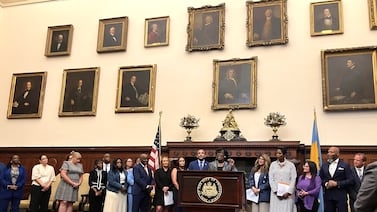Sign up for Chalkbeat Colorado’s free daily newsletter to get the latest reporting from us, plus curated news from other Colorado outlets, delivered to your inbox.
Child care chains backed by private equity investment firms won’t be subject to new limits intended to protect parents or workers, after a Colorado bill died in the state Senate this week.
Senators initially passed House Bill 25-1011 on Monday, after rejecting a major change made last week in a legislative committee. But by Tuesday, some lawmakers had defected and the bill failed in an 18-16 vote.
Sen. Cathy Kipp, a Democrat from northern Colorado and one of the bill’s sponsors, said, “We were just unable to convince people between second and third reading that they should stick with us.”
The two readings are the initial and final votes on legislation in the full House or Senate.
The legislation represented the first time Colorado lawmakers have considered potential problems posed by private equity firms that buy or invest in child care centers. Experts say private equity backing can hurt child care quality, raise prices for families, and send public dollars meant for classrooms into the pockets of wealthy investors. But leaders of large chains backed by private equity firms say they provide many desperately needed child care seats and that new guardrails would chill investment in Colorado’s child care industry.
About 15% of child care seats for young children in Colorado are housed in centers with private equity backing or ownership, according to a Chalkbeat analysis. These include well-known chains like KinderCare, Primrose Schools, Goddard Schools, The Learning Experience, and brands owned by the Learning Care Group.
Other states, including Massachusetts, Vermont, and New Jersey, have passed laws aimed at such chains in recent years.
Kipp said she’ll meet with the other sponsors after the legislative session to “see if there is potentially a path forward, whether that be next year or the year after.”
The legislation would have required child care chains owned or backed by private equity or venture capital investors to post their tuition and fees online. It also would have required such chains to give families and employees 60 days notice after purchasing a child care center before laying off staff or making enrollment changes.
The original version of the bill also would have prevented a common real estate practice in the private equity world, but that provision on “sale-leasebacks” was stripped out in the House. Experts say sale-leasebacks, which force acquired companies to sell their property and then lease it back from the new owner. can harm companies financially by forcing them to shoulder a new expense.
Ann Schimke is a senior reporter at Chalkbeat, covering early childhood issues and early literacy. Contact Ann at aschimke@chalkbeat.org






